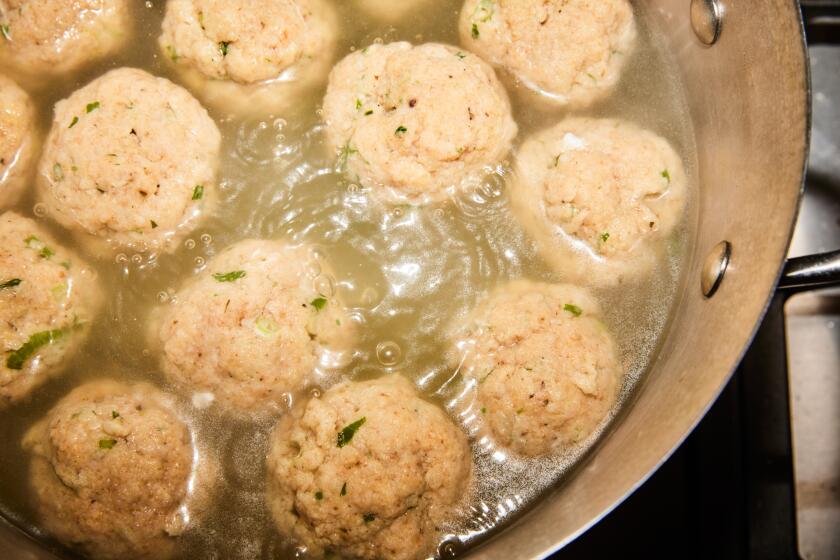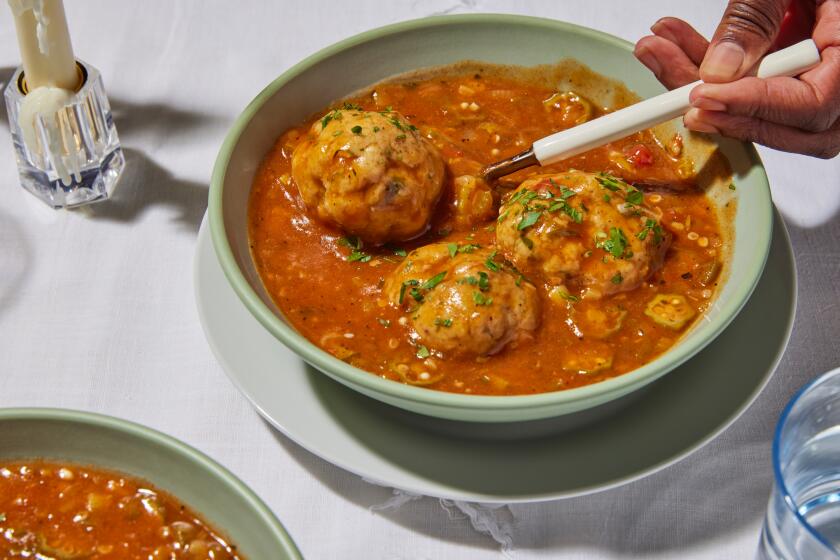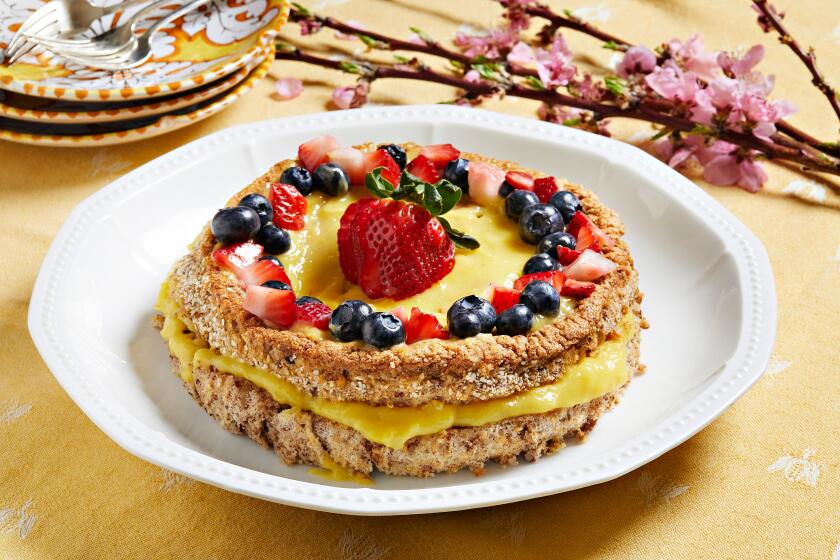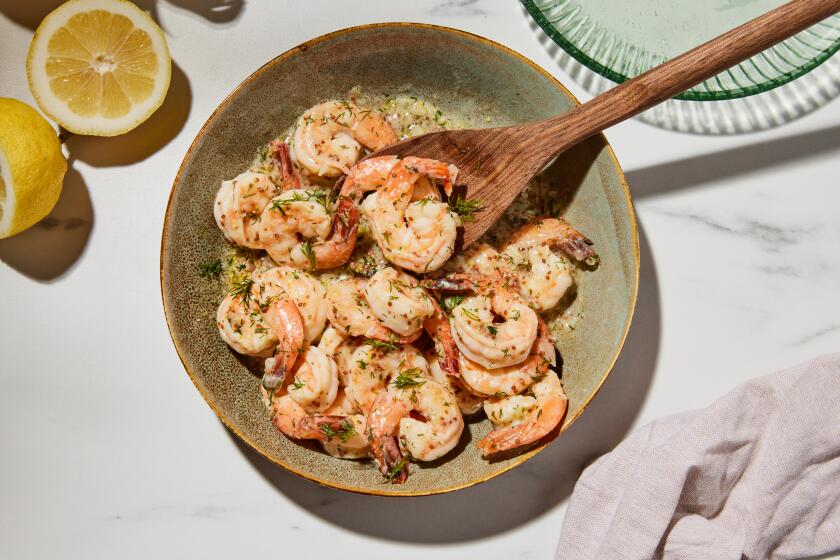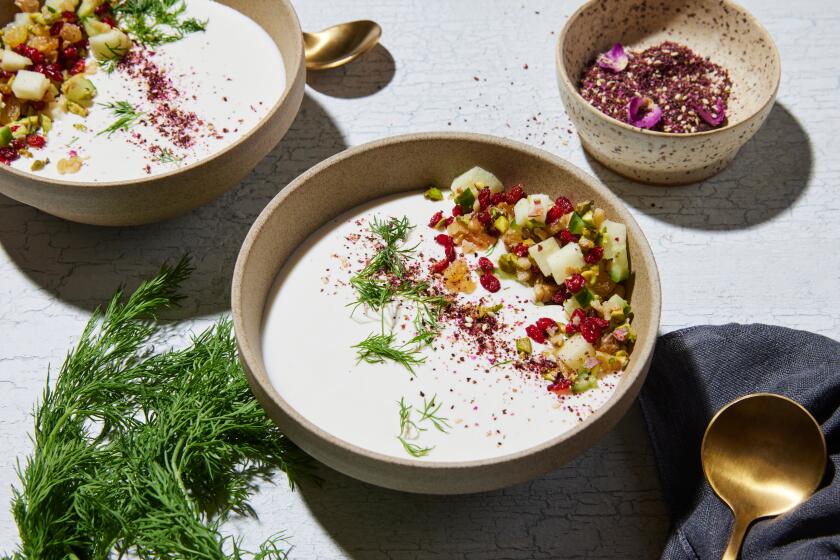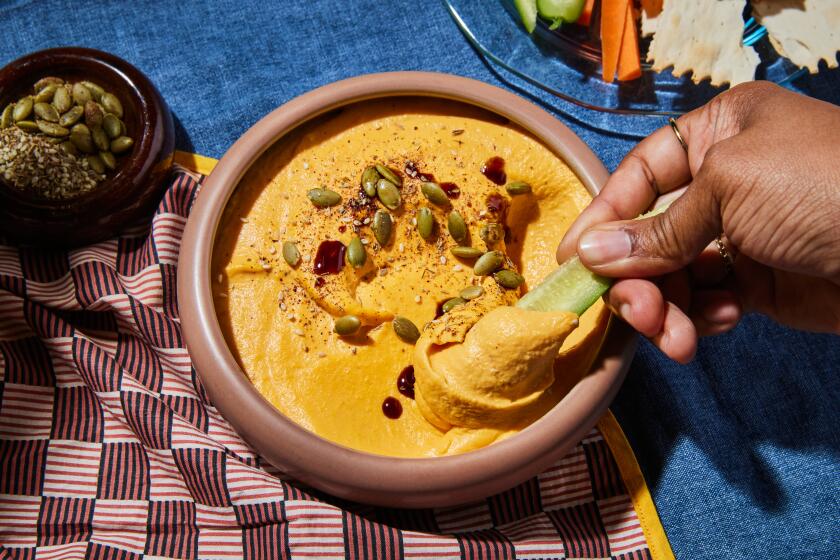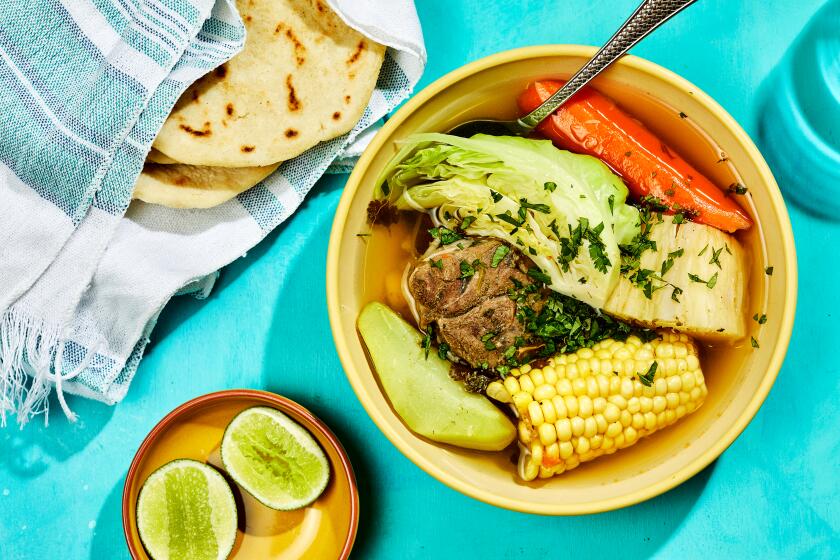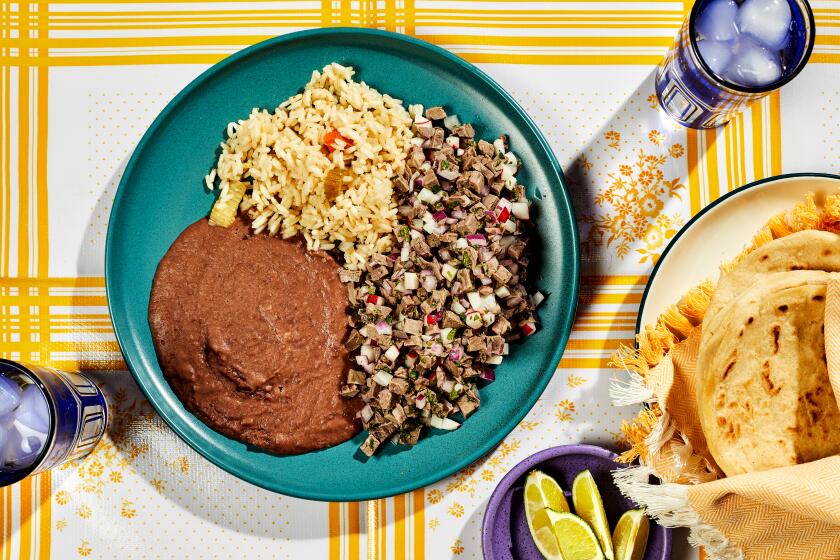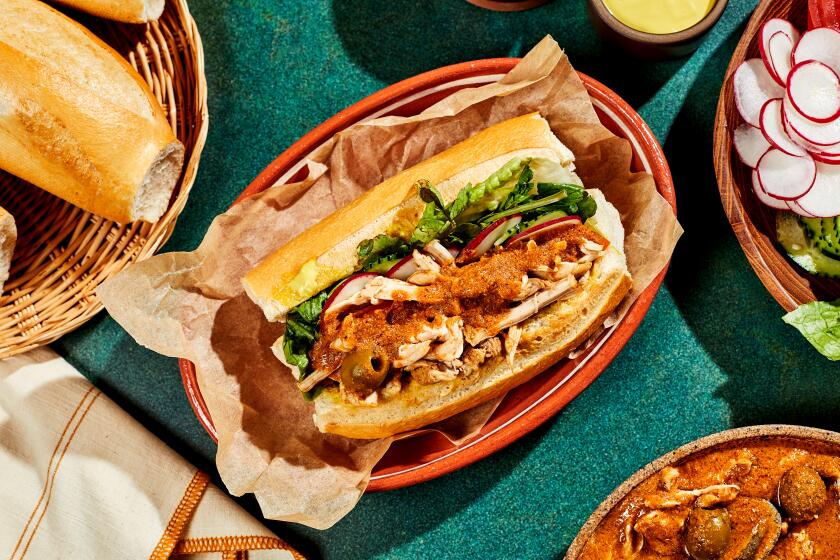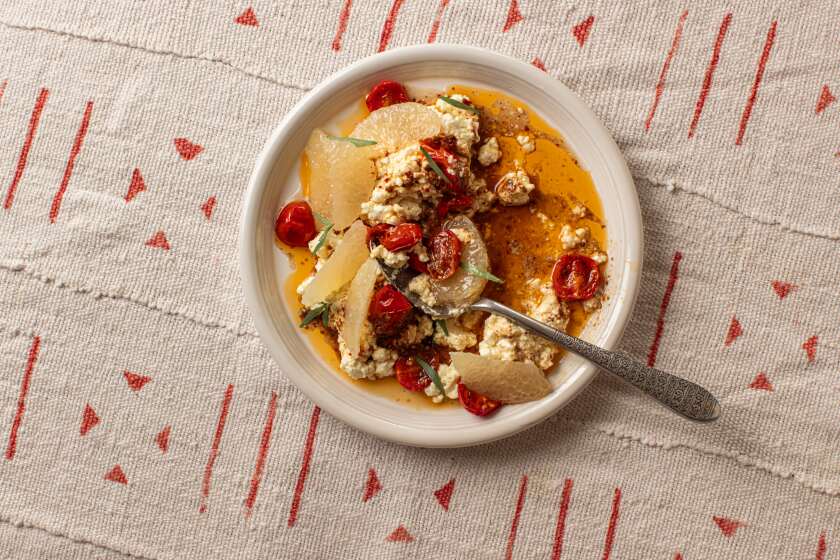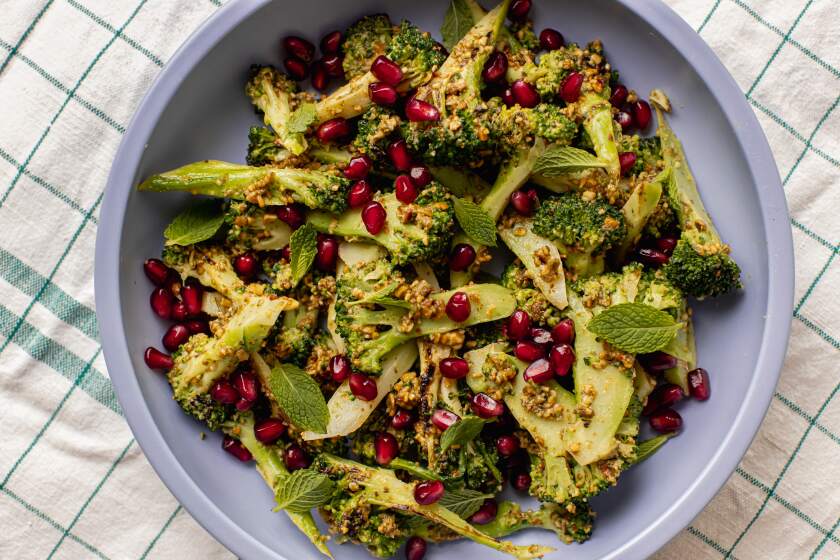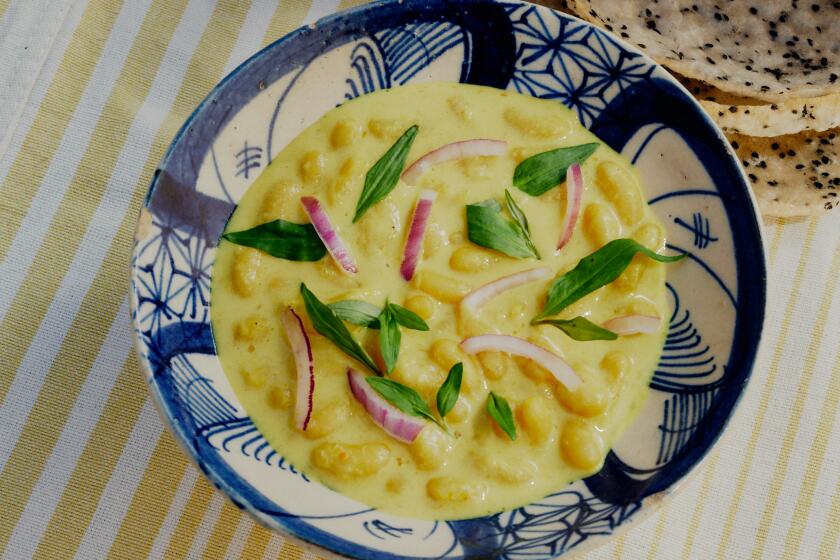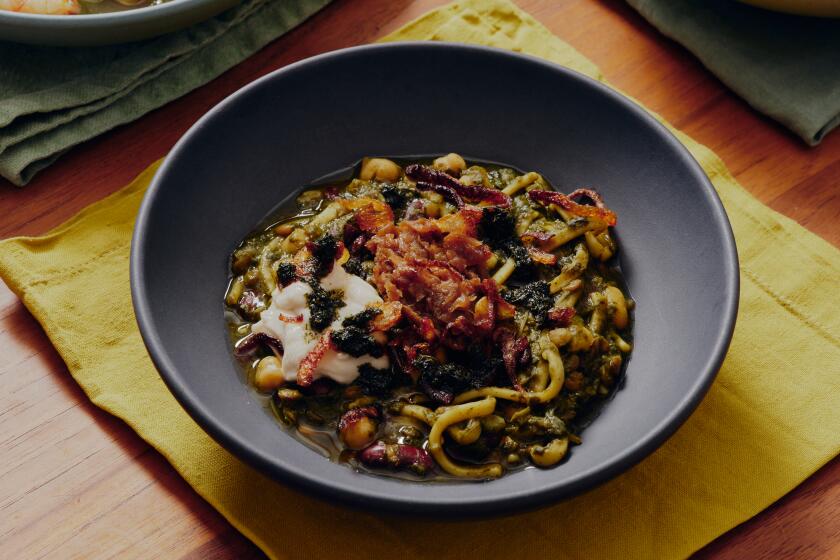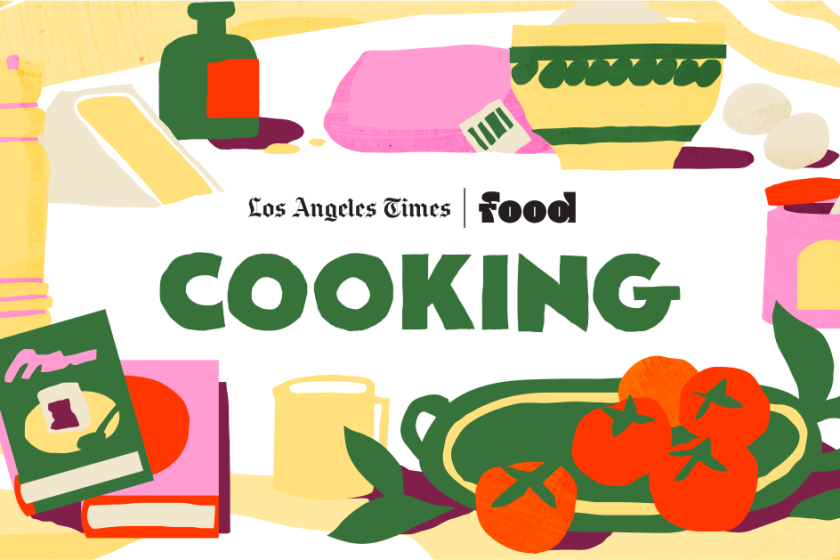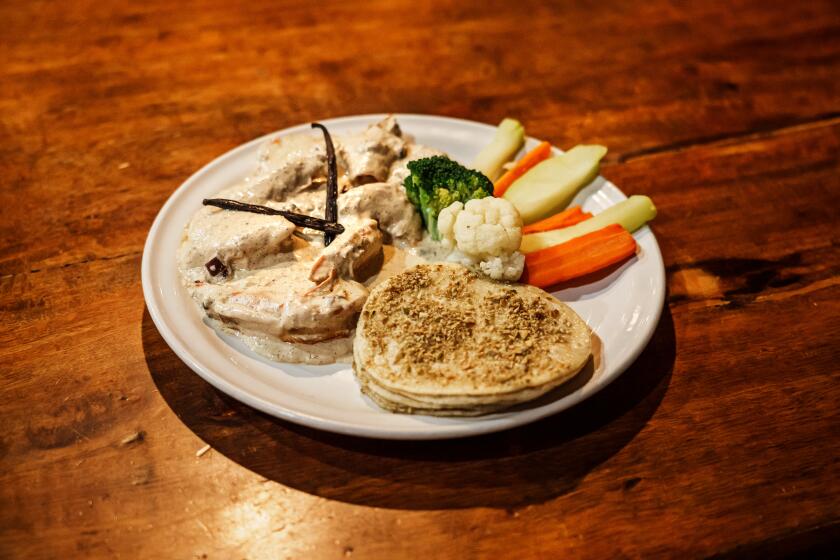Cashew cream fettuccine Alfredo with sauteed spinach and cheese crisps (gluten-free)
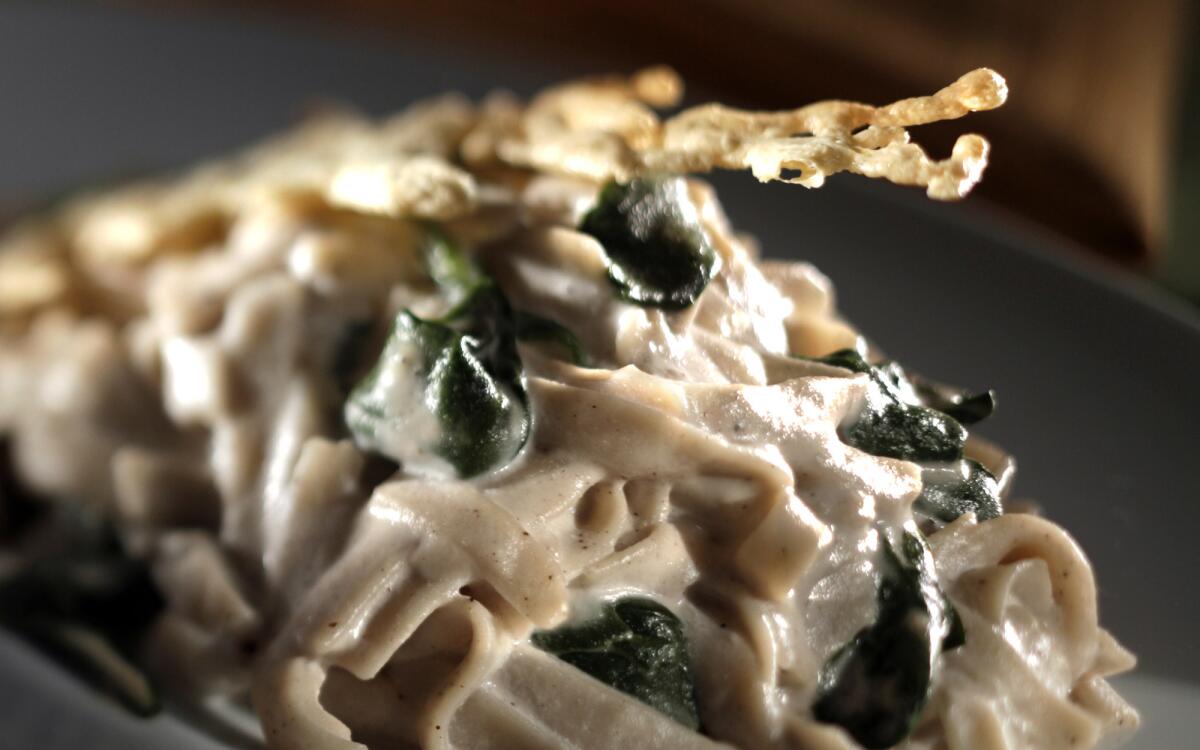
It’s not often that you see a picture of an author swigging from a flask in a cookbook, but that’s exactly what Evan George, one-half of the L.A.-based food blogging duo known as Hot Knives, is doing on the back cover of the pair’s new vegetarian cookbook, “Salad Daze.” And wait a minute: What’s his partner Alex Brown smoking in that picture anyway? It better be medicinal.
Irreverence is key to why the Hot Knives boys, both 29, got a cookbook deal in the first place. Rather than going the safe and sane route of banking on an established chef for its first full-length cookbook, Mark Batty, the publisher, placed his bets on Hot Knives’ underground following -- as cultivated by their edgy video blog -- of DIY punk rockers, scrappy beer lovers and hard-core farmers market foodies.
And he’s not alone, two other publishers have steered a similar course using young, nontraditional, up-and-coming Los Angeles talent. The first is a vegan cookbook from Spork Foods called “Spork-Fed,” featuring sisters Jenny Engel, 30, and Heather Goldberg, 33, who, in contrast to Hot Knives’ urban edge, have made a name for themselves through their wholesome, girl-next-door approach to vegan cooking classes and an online cooking show. The second is called “Party Like a Culinista,” featuring fun and healthful party recipes by Jill Donenfeld, 27, who founded a personal chef and catering service called the Culinistas. The book is co-written by one of her company’s New York City-based chefs, Josetth Gordon, 31.
“An online reputation was clearly helpful,” says Batty about his decision to work with Hot Knives. “What the book represents is the way they behave, and fortunately a lot of people seem to like that. It works for them. It works for me, actually.”
When Batty first approached Hot Knives to do the book, he signed them to a two-book contract, with the second, a gritty party cookbook called “Spring Blaze,” due out next year. Now Batty says he’d like to publish two more. Batty’s imprint features beautifully designed, richly colored books celebrating eccentric, niche subjects, including how to put together the perfect Bento box and what Brown calls “an insane book about Middle Eastern chicken stands in New York City.”
The latter was part of a suite of books Batty sent to Hot Knives to lure them in. And it worked. An uncompromising dedication to a particular vision of food and what it means to culture and community is what distinguishes this autodidactic new school of chefs. In place of formal training, they have clocked hundreds of hours in the kitchen and crafted food-centric career paths that have drawn devoted fan bases enamored of their particular --wildly diverse -- approaches to cuisine.
“The modern popular [chef’s] cookbook is potentially ghost-written, developed from restaurant recipes, tested by other people and then you slap someone’s famous mug on the cover,” says George over a glass of Telegraph Winter Ale at Echo Park’s Sunset Beer Co. “Ours are developed by us and tested in our own kitchens. Each recipe has a story, written by us, so it’s a good read too.”
“Salad Daze” features recipes focused mainly on oddities from the farmers market, including kohlrabi latkes (“extra shredded kohlrabi turns the world upside down”), melted endive (“molten-soft and warming, this dish had our young hearts at first bite”), squash noodles, sage pesto (“Your freezer is for ice cubes, booze and batteries -- not herbs”), and blood sausage mushrooms (“There’s little pleasure in textured soy; no mystique to black bean patties”).
In contrast, “Spring Blaze” will feature recipes for “The trashiest, most fun parties you want to be at every summer. A pizza pool party, a gutter taco party, that sort of thing,” says George.
“We’re the scumbag Martha Stewarts,” Brown adds cheerfully.
Meanwhile, in another universe, Donenfeld’s party cookbook is all sass and class, with a recommended “wardrobe change” written into each recipe signaling when it would be a good time to swap out those sauce-stained sweats for pretty party duds.
“What drives me is really this idea of creating connectedness, and I’ve done that thus far through food,” says Donenfeld, who splits her time between Malibu and New York and self-published her first cookbook on Madagascar cuisine after an extended stay in Africa. Her taste buds and cooking techniques have also been molded by extensive travels in Vietnam, India, France and Italy.
Her publisher, Lake Isle Press, traffics in specialty cookbooks and is run by a woman named Hiroko Kiiffner, who “basically put Rachael Ray on the map,” says Donenfeld of the 13 books Ray has published with the imprint.
Donenfeld first pitched her Madagascar cookbook to Kiiffner in 2005 and then ran into her again in 2009 at a potluck for the New York Women’s Culinary Alliance.
“I’m a very tenacious person, and I really believe that what I’m bringing to the universe has value, so I don’t mind selling hard,” Donenfeld says. “So I just started pitching ideas.” Six months later, she signed a contract.
“Party Like a Culinista’s” wholesome recipes for entertaining include miso-glazed salmon, pulled pork with pineapple jam, warm squash salad with farro, and yellow tomato gazpacho shooters.
--
‘Vegan fairies’
You won’t find salmon or pork in “Spork-Fed,” the Spork Foods sisters’ vegan cookbook, but you will find plenty of recipes aimed to satisfy a carnivorous palate. Since the women began their careers as teachers, they have been guided by many students interested in a vegan lifestyle who still go home to families that are anything but.
“We picked the recipes that we knew our students were presenting the most proudly to their meat-eating families and friends,” Goldberg says.
Tempeh bacon-stuffed pompoms, South Carolina barbecue tofu sandwiches, seitan Wellington with a creamy spinach sauce and spiced beer-soaked figs with ricotta filling round out a cookbook filled with tips on how to successfully stock your refrigerator and pantry with vegan products.
The book was published by St. Lynn’s Press out of Pittsburgh, which specializes in books about spirituality and healing. Engel says that its publishers approached the sisters because “they are vegetarian, and they like books that jibe with their whole way of life.”
The sisters are anything but mystical about their diet, and each recipe has a special section called “For Your Smarts,” which dishes up an interesting fact about a certain ingredient, and “For Your Parts,” which gives detailed information about the nutritional and supposed medicinal benefits of an ingredient. For example, at the end of a recipe for chickpea cakes with sweet truffle drizzle, they write, “Chickpeas have a lesser-known trace mineral in them with a cute long name, molybdenum. Our bods need this to detoxify sulfites, which are a preservative and not good for us!”
The blithe and cheery nature of the writing is also a reflection of the women in real life. This explains the book’s forward, which is by actresses and sisters Zooey Deschanel, a non-vegan, and Emily Deschanel, a vegan. They rightly note that the Spork sisters are “more like vegan fairies than human beings.”
Prepare the cheese crisps: Heat the oven to 375 degrees. Sprinkle the cheese on a parchment-lined baking sheet and bake until crisp, 12 to 14 minutes. Set aside to cool completely, then break into large uneven pieces to garnish the pasta.
While the cheese is baking, bring a large pot of salted water to a boil. Add the fettuccine and cook according to the instructions on the package, generally 8 to 10 minutes. Drain and run the pasta under cold water to stop the cooking process. Drain again, and return to the pot, tossing with the oil to keep the pasta from sticking together. Set aside in a warm place.
Heat a shallow skillet over medium heat. Melt the butter in the skillet, then add the shallots, cooking until softened, about 3 minutes. Remove the shallots using a slotted spoon, leaving the butter in the pan. Set the shallots aside in a small bowl.
Add the spinach to the skillet and cook over medium heat until just wilted, about 2 minutes, stirring frequently. Remove from heat. Toss the spinach with the fettuccine.
Prepare the alfredo sauce: In a blender or food processor, combine the almond or soy milk, creamer, cashews, sea salt, black pepper, miso, lemon juice, nutmeg, dry mustard and the cooked shallots. Blend until smooth, about 3 minutes. Transfer to a medium heavy-bottom pot and heat over medium heat until warm, 4 to 6 minutes, stirring frequently. Stir in the arrowroot slurry, whisking until the sauce thickens slightly, then remove from heat.
To serve, add sauce to fettuccine and spinach and toss to coat. Serve warm with one piece of cheese crisp per serving.
Get our Cooking newsletter.
Your roundup of inspiring recipes and kitchen tricks.
You may occasionally receive promotional content from the Los Angeles Times.


